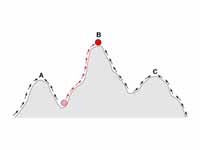African-American women need greater obesity effort
Obesity researchers have found that African-American women need to consume fewer calories or do more activity to achieve the same weight-loss rates as Caucasian women who start at a similar size. They cite a lower metabolic rate to explain the greater difficulty in reducing obesity.
The University of Pittsburgh, PA, team of metabolism experts say that previous research has also found that African-American women fail to lose as much weight as Caucasians in response to medical help, and that this has raised questions about how well the group adheres to the measures put in place.
The current study, however, confirms that willingness to participate is not a factor for these women in the success of weight-loss measures to restrict calories or increase physical activity.
Findings have also ruled out that differences cannot be explained by a lack of "culturally sensitive" interventions.
James DeLany, PhD, associate professor of endocrinology and metabolism at the Pitt School of Medicine, says:
"At first, it was thought that perhaps the African-American women didn't adhere as closely to their calorie prescriptions or that the interventions were not culturally sensitive. But even in research projects that were designed to address those possibilities, the difference in weight loss remained."
Dr. DeLany explains that similarly sized bodies do not always respond to the same obesity measures for equal weight-loss gains - metabolism varies in different groups of people.
"We prescribe how many calories are allowed and how much activity is needed during weight loss interventions based on the premise that people of the same weight have similar metabolic rates," he says.
Dr. DeLany adds:
"But to account for their lower metabolic rate, African-American women must further reduce the number of calories they eat or use up more of them with exercise in order to lose the same number of pounds in the same time span as a Caucasian woman of the same weight."
The study included 66 Caucasian and 39 African-American women who were severely obese. The research:
- Examined changes in body weight and energy expenditure, and
- Measured physical activity and energy intake.
During the 6 months of the study, the weight-loss intervention included "prescriptions" of calorie restriction and increased physical activity.
The Caucasian women achieved 3.6 kg more weight loss than the African-American women.
The research paper concludes that "neglecting to account for the lower energy requirements in African-American women" results in a "lower level of calorie restriction, and hence, less body weight loss."
The African-Americans' lower energy requirements were around 2,900 kcal/day, compared with around 3,100 kcal/day for the Caucasian women.
Activity trackers
The researchers used what they call "multi-sensor activity monitors" to track physical activity during the study, and the research paper cites an example called the SenseWear armband.
This device is similar to the consumer gadgets that have gained traction in 2013 - as seen in MNT's 2013 news review.
The armband used by the present researchers is designed specifically for clinicians to help people with morbid obesity. The manufacturer lists that it outputs:
- Raw data from sensors that can be exported to spreadsheets
- A graph showing different types of activity over time.
The physical activity component to weight loss has other well-established benefits. News on Friday, December 20th, revealed that walking an extra 2,000 steps every day reduces cardiovascular risk - by as much as 8%, the study in The Lancet suggests. Written by Markus MacGill
-
Glycogen Levels And The Secret Reason Why You Are Fat
Glycogen is the name for carbohydrates that are stored in your muscles
-
Top 7 Motivational Weight Loss Tips
Here are some great motivational weight loss tips. They will not o
-
3 Tips To Ensure Weight Loss Success During The Global Financial Crisis
People are hurting right now as a result of the global financial cr
-
Close Kept Secrets To Weight Loss Lesson 42
Lets have some fun! Right now, put on some butt-movin? music. Get up
-
Losing Weight Via Those Natural Nutritional Supplements
Many people become overwhelmed when in t
-
12 Swimsuit Season Diet Secrets
V
- DON'T MISS
- How to Reduce Weight in 7 Days
- 4 Diet Plans That Can Help You Lose 10 or More Pounds Fast
- How Do Weight Loss Pills Work?
- Lose Weight with the Diet Solution Program
- Cinnamon Applesauce
- Fed Up? Tips and Tricks for Integrating Healthy Eating with Kids
- The Best Low Calorie Snacks
- Fat No More - What To Do When You're Ready To Lose Weight For Good
- Achieve Successful Weight Loss With These Handy Tips
- The Healthy Rules I Broke To Lose 30 Pounds




